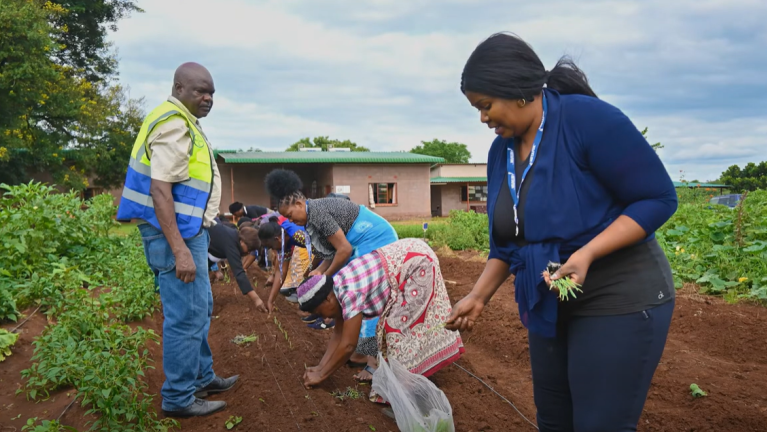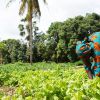Tractors and training for better harvests
Success thanks to modern agriculture: farmers receive further training at the German-Zambian Agricultural Knowledge and Training Centre.
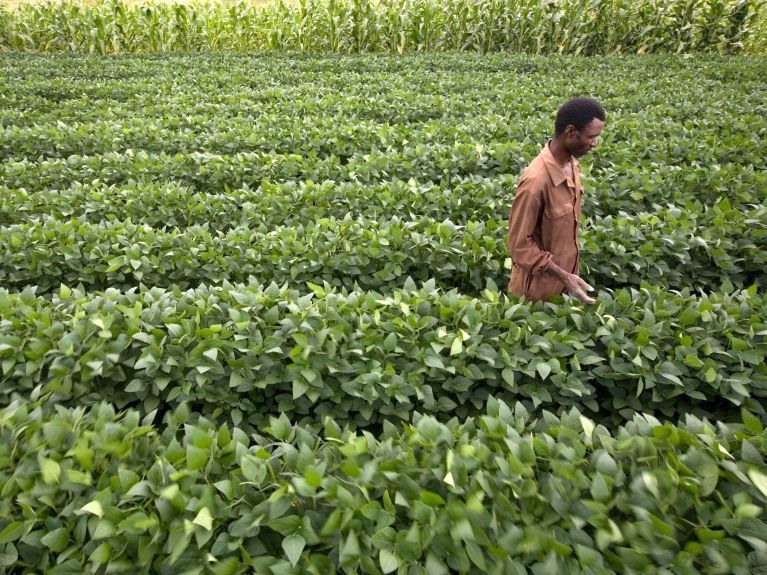
Just a few years ago, Grey Njhovu’s farm in the Zambian town of Mumbwa was very different to the way it looks today: he used to work little more than two hectares - the lion’s share of his 50 hectares of land lay fallow and unused. These days, Njhovu farms 15 hectares, growing for the most part soya and corn. He explains that the change came about thanks above all to the training he received at the German-Zambian Agricultural Knowledge and Training Centre (AKTC).
Boosting local agriculture
The training centre is situated around 65 kilometres to the north of the capital Lusaka, on one of Zambia’s most important roads. The project is a collaborative venture between the German and Zambian agricultural ministries. Since it opened in 2014, more than 18,000 farmers have received training at Chaloshi Farm, which is run by the Golden Valley Agricultural Research Trust (GART). 43 percent of participants are women.
Dieses YouTube-Video kann in einem neuen Tab abgespielt werden
YouTube öffnenThird party content
We use YouTube to embed content that may collect data about your activity. Please review the details and accept the service to see this content.
Open consent formNjhovu has already completed two training programmes at the AKTC: a course in Farming as a Business and one that trains participants to work with tractors. Practical courses such as these are particularly popular with farmers. Not only do they learn to run their farms as businesses and increase their profits by planning better, the AKTC also teaches them about farm machinery - both how to operate and properly maintain it. Njhovu is also benefiting from this: “The knowledge that I gained at the AKTC helped me to grow and expand my business,” he says. [CK1]These days, he farms not only soya and corn, but also tomatoes, cabbages and potatoes. In addition, he keeps cattle, goats and hens.
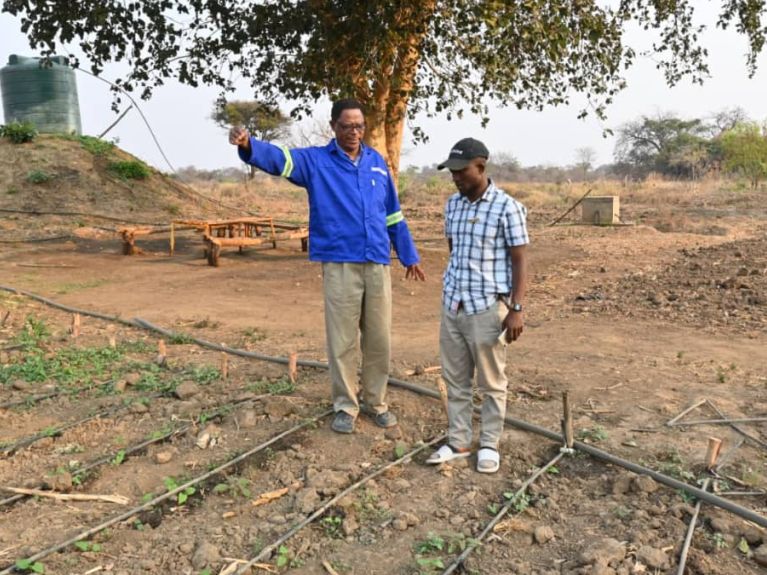
Responses to the global climate crisis
The AKTC is part of the bilateral cooperation programme run by Germany’s Federal Ministry of Food and Agriculture (BMEL). Germany is committed to sustainable and fair agriculture worldwide – and thereby contributes to food security. This is more urgently needed than ever in Zambia: increasingly frequent droughts caused by the climate crisis are having a serious impact on farmers, leading to crop failures, hardship and hunger. Modern, climate-resilient and resource-efficient agriculture is seen as offering a way out of this crisis. At the AKTC, farmers learn how this works.
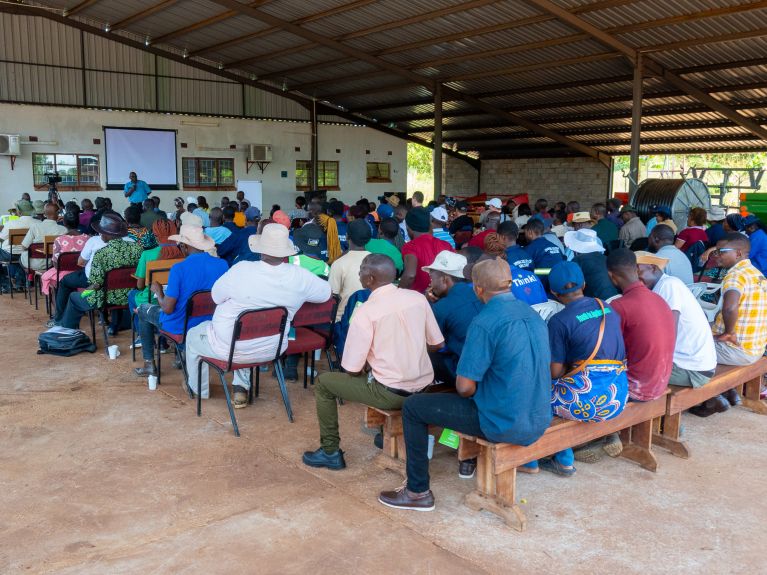
One of those who passes on his knowledge to others is Helmut Anschütz. He works for the German company GOPA AFC, which runs the project in Zambia, and is the centre’s team leader. Before Anschütz took over at the AKTC, he worked as a farm manager in various African countries – as did many members of his team, who have practical experience of agriculture. “Our background means that we work with the farmers on an equal footing,” stresses Anschütz.
Access to modern agricultural equipment
Alongside the research institution GART, the Zambian National Farmers Union is one of the AKTC’s important partners. The AKTC also receives support from numerous international companies - such as seed, irrigation and agricultural equipment firms. “Thanks to these partnerships, our participants can be introduced to the very latest agricultural equipment and try it out for themselves,” explains Helmut Anschütz. The courses are also very popular with students of Zambian universities, with which the AKTC collaborates closely.
Tractor licence in twelve days
It is above all farmers like Grey Njhovu, who want to expand their business, that are the AKTC’s main focus, however: people who supply produce for markets and are already working with modern equipment. Depending on the topic, the courses last between one day and one week. Anyone wishing to acquire their tractor’s licence can do so in a twelve-day intensive course.
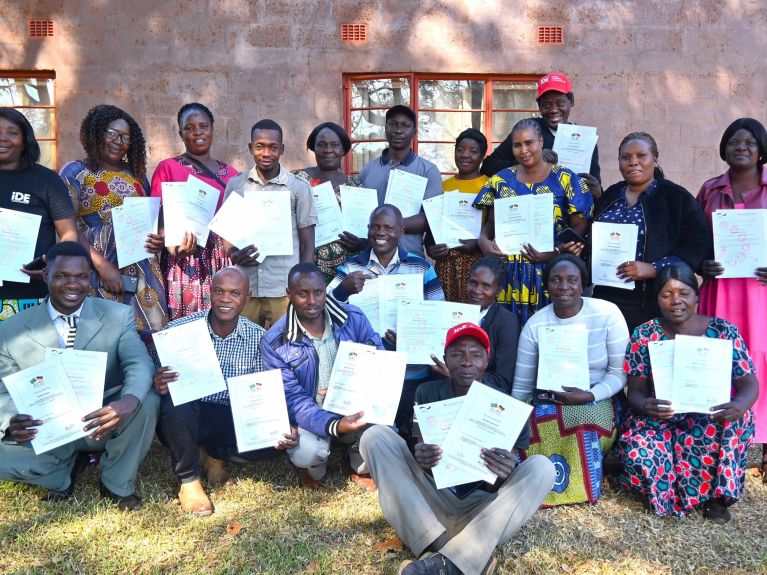
The AKTC has more than 72 hectares of land on which participants can conduct practical experiments in cultivation: soya beans are grown here during Zambia’s rainy season, while irrigation systems ensure that potatoes and wheat thrive in the dry months. “We have excellent soil here and a stable water supply,” stresses team leader Helmut Anschütz. Part of the land is reserved for research projects - to test how sustainable growing methods will work under real conditions.
Post-course learning continues via chat
According to the BMEL, 58 percent of the land in Zambia is suitable for agriculture, yet only 15 percent is actually farmed at present. Machines could help increase production. “A tractor is a big investment for a farmer,” says Anschütz. Thanks to a loan, Njhovu was able to purchase a tractor a few years ago. “Initially I used ox draught power, which was of course limited,” he explains. The tractor now enables Njhovu to farm a larger area. The machine not only makes his work easier, however - Njhovu even rents the tractor out to other farmers. Taking part in a course at the AKTC helped him diversify his business, says Njhovu. “I am able to acquire additional income.”
Njhovu can also imagine doing some other courses at the AKTC. “Learning never ends,” he says. This is also clear from the chats that participants use to keep in touch and share ideas once the courses are over. The last day of the course doesn’t mark the end of the AKTC’s support: the centre’s experts continue to be on hand to provide advice and active support when farmers are putting their new knowledge into practice in their own fields.
Detailed follow-up reviews are conducted to discover whether the training actually pays off for the farmers in question. Independent experts visit their farms and document their progress. The feedback to date has been overwhelmingly positive, reports AKTC team leader Helmut Anschütz. In future, even more farmers will be able to benefit from the courses. A mobile team that is currently being trained up will soon travel around the country to offer courses at the local level.
